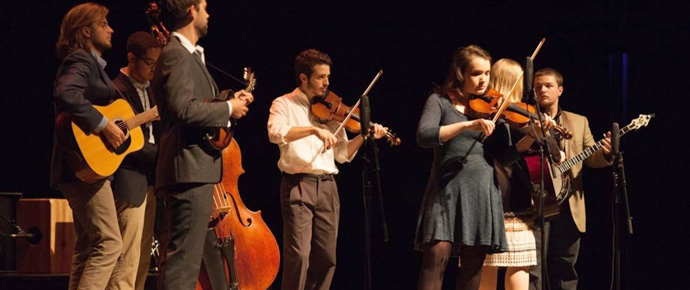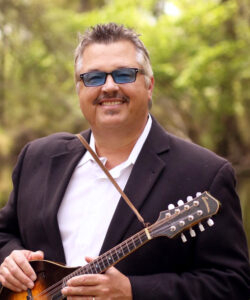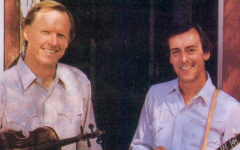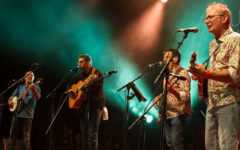
Last summer (2016) the University of North Carolina at Chapel Hill’s Music Department hired Russell Johnson, the well-known bluegrass singer, songwriter and mandolin player from Cary, North Carolina, to the faculty position of Ensemble Director for what was called the Carolina Bluegrass Band.
Of course, the University of North Carolina bluegrass music program isn’t the first one established at an American university. There are some long-standing courses, such as that at South Plains College, Levelland, Texas, and ETSU (East Tennessee State University), Johnson City, Tennessee. There is a program at the Hazard Community Technical College, Hyden, Kentucky, and at Morehead State University, Morehead, Kentucky, as well.
All are very well-established places of learning various aspects of the bluegrass and general music business. The IBMA has a fairly comprehensive list of universities and colleges online.
To find out what is involved in the process of setting up a bluegrass music program in a university or college, Bluegrass Today spoke to Russell Johnson and Professor Jocelyn R. Neal, Associate Chair, Department of Music, effectively Johnson’s boss.
Johnson also touches on the difficulties that he has encountered thus far.
What is the job title?
“Faculty Position: Ensemble Director for the Carolina Bluegrass Band
The Music Department of the University of North Carolina at Chapel Hill solicited applications for an ensemble director for the Carolina Bluegrass Band, starting 1 July, 2016. The Carolina Bluegrass Band is part of the Bluegrass Initiative, launched by the Music Department in 2016, which includes a bluegrass ensemble, new academic courses, symposia, and performances.
The ensemble director will lead all aspects of the bluegrass ensemble during the academic year. Responsibilities include recruiting and auditioning students, designing the course syllabus, leading weekly rehearsals, managing publicity and outreach, and presenting public performances each semester. The ensemble director will collaborate with other faculty to plan relevant master classes and symposia. The bluegrass ensemble is open to both music majors and non-majors; the ensemble will satisfy some degree requirements for music majors.
Qualifications: three years’ experience as a performer and band leader preferred; proficiency on at least one traditional bluegrass instrument; competency coaching all traditional bluegrass instruments. Education: bachelor’s degree required; master’s degree in music, southern studies, humanities, or a related field preferred. Review of applications began on 20 April, 2016. Salary being be commensurate with qualifications and experience. UNC-CH is an equal opportunity employer. Women and minorities are encouraged to apply.”
….. and what was it that you thought you could bring to the position?
“I’ve been a band leader since I started playing music in the late 1980s and felt that I matched up with the criteria in the job description. I also taught individual lessons for six years.”
What challenges did you face during the first semester?
“One challenge has been that only a very small percentage of the students have had any exposure to bluegrass. So we have to start with the basics, from the ground up. (Of the 25 students that have taken the course last fall and this spring, only two (8%) have had any bluegrass background.) Others have been exposed to folk, Americana, acoustic, jam bands (The Avett Brothers, Mumford and Sons, Nickel Creek) or older country music (Hank Williams, Louvin Brothers), but only the two or three would know who Bill Monroe and Flatt & Scruggs were unless they took the bluegrass history course at the University.
If a student brought in a traditional song, for instance Wayfaring Stranger, they knew it from a modern-day interpretation like Ed Sheeran’s. All of the violin players (fiddlers) came from a classical background, most of the guitarists were classically trained, except the ones that were also singers. Bass players have been jazz and orchestral players.
Also getting the word out that there is a bluegrass ensemble on campus to the student body has been challenging. It’s so new, not many students know about it. The first semester 70% were music majors or minors, this semester 80% are music majors or minors. I don’t feel all of the student body knows it’s available yet.”
How was the bluegrass ensemble received within the music department?
“Maybe a question for Professor Neal.”
Professor Jocelyn R. Neal, Associate Chair, Department of Music of shares her thoughts on the question ……..
“The UNC Bluegrass Initiative, which we launched in Fall 2016, aims to bring together the many resources UNC has that relate to bluegrass music with a more direct undergraduate experience and interface with the community. Our archives, including the Southern Folklife Collection, include remarkable holdings in bluegrass music; many of our faculty on campus have researched and published on bluegrass; graduate students in several of our departments have done excellent research projects that engage bluegrass.
But up to the present, we did not have a good way to connect our undergraduate students with this music. The Bluegrass Initiative has changed that by adding bluegrass to the Department of Music’s formal offerings.
Students can now play in the Carolina Bluegrass Band and receive course credit for that music-ensemble course just like they would for other ensembles such as Global Rhythms, Charanga Carolina, or performing in a departmental opera production. And I teach an academic course on the history of bluegrass music, which fills different elective options for students, similar in concept to histories of other musical practices, traditions, or genres.
Our UNC Bluegrass Summit, which we hosted last November, brought these threads together: a public audience who heard scholarly research, exhibition of our archival holdings, both a workshop and a headline concert from Steep Canyon Rangers (who boast several UNC alums), and more.
In hiring our band leader, I was looking for someone who was a multi-instrumentalist who could coach individual players in the band; someone who knew how to create a tight ensemble whose approach to the music is more than just the sum of the individual players on their own instruments; someone who understands the rich and complex history of the music as well as its present styles and direction; and someone who had the skills to coach the students for live performance and presentation. Russell Johnson’s experience in all aspects of the industry, both as bandleader and performer, as songwriter and studio engineer, and three decades’ of working in the business, made him a terrific match for the job. But beyond that, he was interested in taking on the project of bringing bluegrass to college students and guiding them to explore the music.
As Russell explained, for many of our students, this is not music that they have internalized or that they learned at home. This opportunity to explore something new is one of the best aspects of a university music department: it’s a real learning experience that broadens and enriches their training as musicians, both for those who see bluegrass as a primary home and those for whom it really is an exploration outside their musical home.
The inclusion of bluegrass in the Department of Music matches our broader goals of including more vernacular and popular musics in our offerings, areas that are increasingly relevant to our students in a global community. Our faculty have been researching and writing about music and culture in these contexts for years; bringing these classes into the department allows our undergraduates more access to these growing areas of study.
Finally, North Carolina is home to a number of significant strands of bluegrass music. This inclusion of bluegrass in our curriculum extends our University’s responsibilities and attention to this region, its history, and its interface with the rest of the world.”
What was the reaction of the rest of the student body?
Russell Johnson comments ….
“That would be hard for me to answer. It’s a big school, close to 20,000 undergraduates. All I have to base it on would be the response the band received at their Fall concert. There were mainly students in the audience, and I thought it was well received and went over great. A very enthusiastic response. Every seat was filled and basically standing room only (which I understand is not always the case for department concerts). I think a lot of music majors/minors are interested in what’s happening with the ensemble.”
You’re holding auditions for the spring semester … are you seeking a different set of musicians, or for those to augment the first band members?
“I had nine students return from the first semester class of 15. I have 18 enrolled this semester with two auditing. I have split them into two different bands of about 10 each. I do not have a traditional five or six-piece band yet. Our performances are based on students coming in and out in different groupings to perform songs so that everyone is engaged and performing. Everyone learns to play the songs but we ‘feature’ different students on different songs. I eventually would like to have a band of six-seven that performs the entire repertoire.”
What are the objectives for the spring semester?
“My objective every semester is to teach students about bluegrass, learn a repertoire and perform a concert.”
Are those from the first grouping looking to work in the professional bluegrass marketplace in the coming months?
“I couldn’t answer that. I do think there are a few that will pursue music full time when they graduate, and I think they have learned things in the bluegrass ensemble they will take with them. For instance, the importance of basics like tuning, timing, harmony singing, arrangements, pacing of a concert, and performing in an ensemble (band) setting and how all the parts need to complement each other.
The University of North Carolina at Chapel Hill is Russell Johnson’s alma-mater.
Currently Johnson leads The Grass Cats, the only group on an independent label that has four singles to reach #1 on the Bluegrass Unlimited national chart.
As a reminder, if you are interested in adding academic qualification to your existing bluegrass talents you might want to check out what’s on offer at the various universities and colleges …..
These interviews were conducted in March and April 2017.









